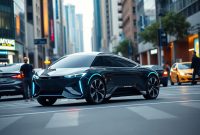There’s a seismic shift underway in the auto industry that you cannot afford to ignore—electric cars are taking center stage, and this transformation is reshaping not only how vehicles are designed, but also how you think about driving and ownership. As the world leans more toward sustainable technology and renewable energy sources, electric vehicles (EVs) are becoming a mainstream option for consumers like you.
As you consider your next vehicle purchase, it’s important to understand the impact of electric cars on the industry. Traditional internal combustion engines are being eclipsed by more eco-friendly alternatives. Major manufacturers are redirecting their efforts to develop comprehensive electric vehicle lineups, hoping to attract you, the environmentally-conscious consumer. This shift is accompanied by a growing infrastructure of charging stations, easing previous concerns about range and accessibility.
Rise in government incentives for electric vehicles means that now may be the right time for you to consider making the switch. Many countries offer tax breaks, rebates, and reduced registration fees aimed at making EVs more appealing. These initiatives not only help you save money but also pave the way for a larger adoption of cleaner transportation. New manufacturing standards are emerging, requiring automakers to prioritize electric models, which in turn influences the features and technology that you’re likely to find in future vehicles.
Your understanding of automotive technology will evolve as electric cars incorporate cutting-edge advancements. Features such as advanced battery technology and integrated smart systems improve efficiency and enhance the driving experience. You’ll find that many electric vehicles offer superior performance, with instant torque providing quick acceleration, and advanced features such as regenerative braking that extends battery life. This technological focus is pushing other automakers to innovate, forcing them to rethink traditional designs and focus more on performance and user experience.
Electric cars also influence the market dynamics of used cars. As EVs gather momentum, you may find that resale values for traditional cars decline. Given that electric vehicles have fewer moving parts and reduced maintenance needs, they can offer you long-term savings. As more people gravitate toward electric options, the secondary market for conventional vehicles faces a shift in demand and pricing.
Moreover, the culture surrounding vehicles is transforming. You might find that community discussions on car ownership and transportation are increasingly leaning towards sustainability. Car-sharing services are integrating electric vehicles into their fleets, emphasizing access rather than ownership and altering how you perceive mobility. In addition, the push for cleaner air quality highlights the potential benefits of diminished emissions from electric cars, making them an attractive option for those who prioritize environmental stewardship.
In the final consideration, electric cars are not just changing the auto industry; they are reshaping your experience as a driver and consumer. The benefits—from financial incentives to advanced technology—position you at the forefront of this automotive evolution. As the industry adapts, so can your choices and preferences, leading you towards a more sustainable, efficient, and innovative future in driving.



